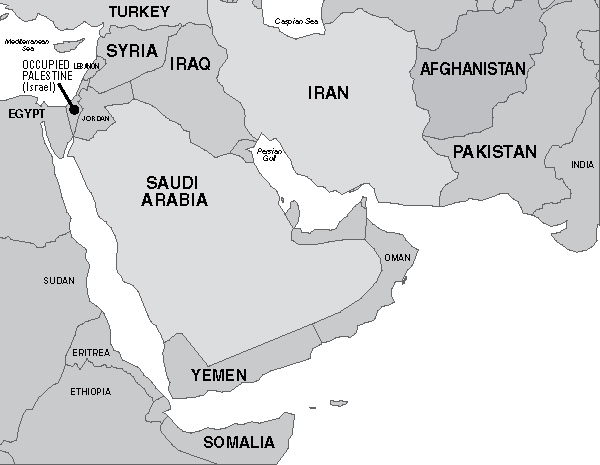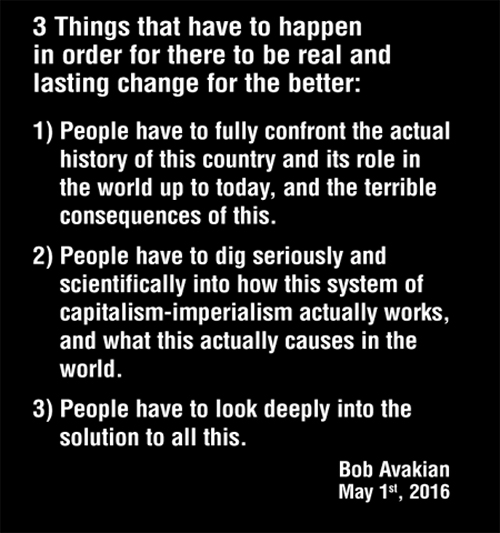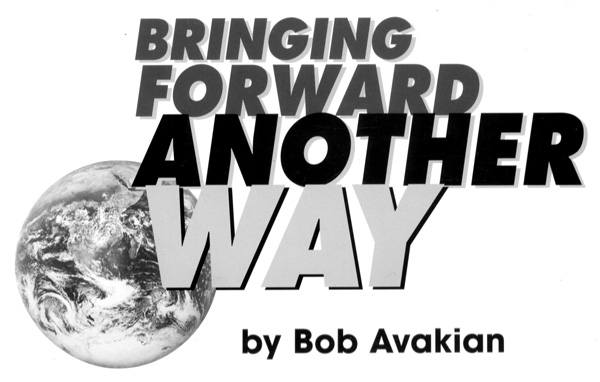With U.S. Ally Saudi Arabia in the News for Assassinating Dissident Journalist Jamal Khashoggi
Test Your Knowledge With the “But That’s Not Who We Are” Quiz
| Revolution Newspaper | revcom.us
The revelations in the wake of the murder of Jamal Khashoggi strengthen and seem to point to the allegation that the head of the Saudi Arabian government, Crown Prince Mohammed bin Salman (MBS), had ordered the murder and dismemberment of dissident Saudi journalist Jamal Khashoggi, and with more news coming out about massive civilian deaths from the Saudi’s war in Yemen, Donald Trump issued an official Statement (“Stand With Saudi Arabia”) strongly supporting the Saudi government. This shocked millions of people. Trump’s mainstream critics make many points, but almost always return to the theme that “This is not who we are; this is not what America does; this is a betrayal of American values.”
But is that true? Test your knowledge of America’s role in the Middle East and what values and interests actually guide it. Take the “But That’s Not Who We Are” quiz.
I. Formation of the Modern Middle East
- The shape of today’s Middle East, the different countries, their borders—and the frequent wars waged there—was primarily shaped by:
- Natural geographic boundaries—rivers, mountains, deserts and oceans.
- Ancient tribal and national rivalries and wars, leading to the formations of countries that each represent one group that is hostile to the others.
- The intervention of foreign powers seeking to control the region.
- The nearly 1,400-year-old split between the Shiite and Sunni branches of Islam.
- Modern Saudi Arabia is:
- The continuation of an ancient kingdom established in the time of Mohammed.
- Ruled by a 1,000-year-old dynasty, broadly supported by the Saudi population.
- A fiercely independent nation whose control of oil gives it vast power to dictate to Western nations.
- All of the above.
- None of the above.
II. American Values
- Which world leader publicly argued that the deaths of 500,000 Iraqi children was “worth it” to achieve his/her government’s political aims?
- Saddam Hussein (former president of Iraq)
- Madeleine Albright (Ambassador to the UN and then Secretary of State under President Clinton)
- Donald Trump
- Ali Khamenei (leader of Iran, which fought an eight-year war with Iraq)
- Bashar al-Assad (president of Syria, which borders Iraq)
- George W. Bush (president of the U.S. who waged the Second Gulf War against Iraq)
- True or False: As the self-proclaimed “leader of the free world” and defender of human rights and rule of law, the United States strongly denounced…
- The military coup in Egypt in July 2013 by General Sisi. After seizing power, Sisi’s troops opened fire on a sit-in protest in Cairo, killing at least 817 people. Then the government arrested and charged 739 protesters and opposition political leaders, sentencing 75 of them to death for their “role” in the deaths.
- The medieval penal system in Saudi Arabia. Saudi Arabia beheaded nearly 600 people between the start of 2014 and April 2018, one-third of them for nonviolent drug offenses. In just the first four months of 2018, they beheaded 48 people, one half for nonviolent drug offenses.
III. Israel: Often, defenders of the U.S. role in the Middle East point to Israel, which they portray as “an island of democracy in a sea of despots,” “a haven for the persecuted Jewish people,” “a land without a people for a people without a land.” Then this narrative is used to justify America’s alliances with regimes like Saudi Arabia “in order to defend tiny, democratic Israel.”
- Which of the following is true:
- Theodore Herzl, the founder of the Zionist movement that led to the establishment of Israel, said: “We should there form a portion of a rampart of Europe against Asia, an outpost of civilization as opposed to barbarism.”
- Israel keeps nearly two million Palestinians in what amounts to an open-air prison on the Gaza strip. The entire area—one of the most densely populated in the world—is fenced and walled in, and people approaching the wall can be shot on sight. Anyone and anything entering or leaving must go through Israeli military checkpoints, and getting out for medical treatment, education or anything else is extremely hard. The Israeli government has actually calculated how many calories the food allowed to enter must contain to keep people above the starvation level. In the spring of this year, Israeli soldiers killed at least 60 and wounded 2,700 unarmed protesters demanding an end to the siege of Gaza.
- Israel officially relegates the Palestinian people to second-class status. A new law on citizenship that has the weight of a constitutional amendment passed in July states that Israel is the “nation-state of the Jewish people,” and that the right of national self-determination is “unique to the Jewish people,” not to all citizens. The law also fails to mention “democracy” or “equality” at all.
- None of this is true, it’s all lies!
- All of this is true, and well-documented.
IV. The U.S. and Saudi Arabia
Which of the following is true?
- The Murder of Jamal Khashoggi:
- Came as a total shock to the U.S. government—it was completely out of character with Saudi traditions of respect for dissent and human rights;
- Was part of a disturbing pattern of repressive activity which the U.S. had sharply criticized before, even going to the point of threatening to cut off aid if there were not improvements;
- Was completely consistent with—even if a bit more open and flagrant than—the widely known practices of the Saudi Government throughout its alliance with the U.S., and which the U.S. has never seriously criticized or opposed.
- The War in Yemen: U.S. news media routinely refer to the war in Yemen as “a proxy war between Saudi Arabia and Iran.” How many Iranian and Saudi troops are fighting in Yemen?
- 75,000 Iranian troops and 75,000 Saudi troops
- 40,000 Iranian troops and 80,000 Saudi troops
- 90,000 Iranian troops and 25,000 Saudi troops
- Zero Iranian troops and 150,000 Saudi troops
- Saudi airstrikes in Yemen have destroyed more than 70 health care facilities in Yemen, a large portion while Obama was president. In August 2016, the Saudis bombed the triage area of the Abs District Hospital, which at that time was treating child victims of a recent Saudi bombing of a nearby school. 19 people were killed, 23 wounded, and Doctors Without Borders finally felt they had to pull their staff out of the whole region.
Finally, President Obama could take it no longer and he: - Strongly denounced Saudi Arabia for crimes against humanity;
- Announced the U.S. would cut off all aid to the Saudi military effort;
- Imposed sanctions on Saudi Arabia to force them to stop committing war crimes;
- All of the above;
- Said nothing, went ahead with a $1.3 billion arms sale to the Saudis, but did worry about whether the U.S. could be legally implicated in Saudi war crimes.

Clip: "Free Yourself from the GTF!"
From: The Trump/Pence Regime Must Go! In the Name of Humanity, We REFUSE To Accept a Fascist America, A Better World IS Possible, A Talk by Bob Avakian

Bringing Forward Another Way is a talk given by Bob Avakian, Chairman of the Revolutionary Communist Party, USA, to a group of Party supporters in 2006 and published in early 2007. This groundbreaking analysis, made during the George W. Bush years, continues to be very relevant, especially in the context of sharpening contradictions centered in the Middle East and aggressive U.S.-led moves against Iran. This work is an illustration of applying the scientific method to approaching international conflicts and understanding social and political contradictions—and identifying where the fundamental interests of humanity lie, providing concrete leadership and guidance for the strategic repolarization for revolution and a thoroughly internationalist orientation. Given the current situation in the world, we urge our readers to restudy this important work or to get into it for the first time. Read more
Get a free email subscription to revcom.us:


